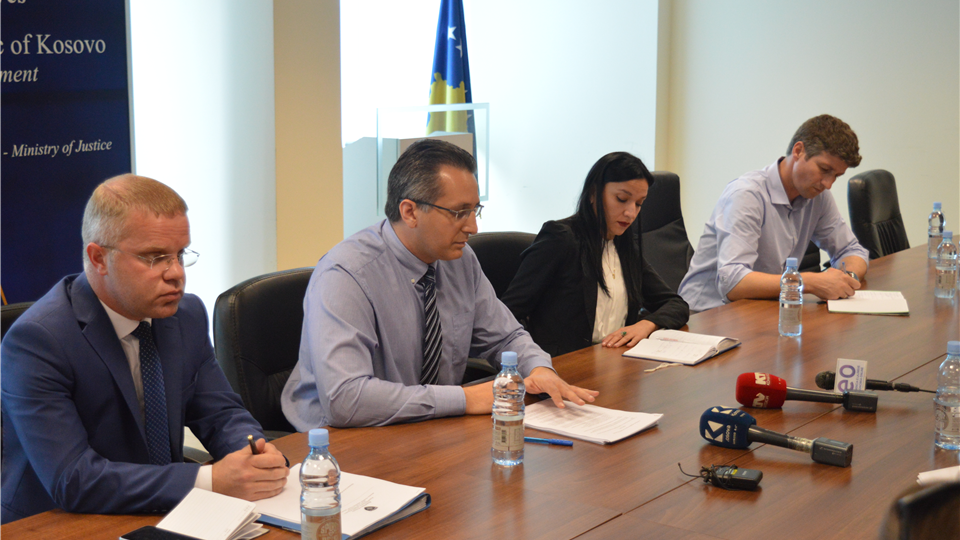

Ministry of Justice committed to transparency and strengthening the independence of the judiciary
Mr Muharremi, in a detailed and concise manner, reviewed the proposed changes and the role of the Ministry of Justice, emphasizing that the Ministry strongly supports and assists in the independence of the judiciary as it promotes policies and legislation that increase the transparency and accountability of the justice system in its entirety.
In this context, he clarified the role of the Ministry of Justice and the Ombudsperson, as well as the legal process starting with the receipt of complaints for possible disciplinary offences of judges and prosecutors to legal remedies for review of appeals according to the multilevel system up to the Supreme Court. Moreover, Mr Muharremi clarified the content of the catalogue of disciplinary offenses and disciplinary measures for judges and prosecutors, always based on the highest international standards.
At the end of these explanations, a debate was held and many questions were raised not only regarding the Draft Law on Disciplinary Liability of Judges and Prosecutors but also regarding other laws and the activities of the Ministry of Justice. The Ministry of Justice remains committed to provide the public with timely and accurate information on developments in the justice sector.
Yours faithfully,
Public Information Office
P.S.
We thank the media present, their constructive discussions, and the debate on the issue of this Draft Law and we invite them for cooperation, in order to increase the transparency, accountability, and efficiency of the justice system in our country.
The following are the brief points regarding the Draft Law on Disciplinary Liability of Judges and Prosecutors
Main points
• The disciplinary procedure is based on Croatia's model. This model has also been agreed with the EU and the US.
• The Kosovo Judicial Council (KJC) and the Kosovo Prosecutorial Council (KPC) are responsible for initiating investigations and imposing disciplinary measures for judges and prosecutors.
• Citizens' complaints against judges and prosecutors are submitted to the following competent authorities:
1. the President of the Court where the judge is employed concerning a judge,
2. the Chief State Prosecutor where the prosecutor is employed concerning a prosecutor,
3. the President of the Supreme Court concerning a President of a Basic Court,
4. the Chief State Prosecutor concerning a chief prosecutor,
5. the KJC/KPC concerning the President of the Supreme Court and the Chief State Prosecutor.
• The Competent Authority reviews the complaint within 30 days and dismisses it if it is not grounded, does not involve disciplinary violation or is statute barred. If the complaint is grounded, the Competent Authority submits to the KJC/KPC the request for the initiation of investigations.
• The investigation of judges and prosecutors is carried out by an investigative panel established by the KJC/KPC. The panel consists of three judges when a judge is the subject of investigation, and three prosecutors when a prosecutor is the subject of investigation. The investigative panel collects evidence and submits to the KJC/KPC a report on the basis of which the KJC/KPC imposes the disciplinary measure. Against the decision of KJC/KPC appeal is allowed before the Supreme Court as the last instance.
• The Ministry of Justice and the Ombudsperson are not entitled to investigate the judges/prosecutors, to impose disciplinary measures against a judge/prosecutor, or to dismiss the decisions of KJC/KPC.
• The Ministry of Justice (MoJ) and the Ombudsperson have the following competencies:
1. In case a President of the Court/Chief Prosecutor, in violation of the law, does not review the complaint of a citizen, MoJ/ Ombudsperson has the power to request from the KJC/KPC the initiation of investigations against him/her for disciplinary violations.
2. In case a President of the Court/Chief Prosecutor, in violation of the law, dismisses the citizen's complaint, the MoJ/ Ombudsperson has the power to request from the KJC/KPC the initiation of investigations on the case dismissed.
3. In case the KJC/KPC does not take a decision on the disciplinary measure within the legal deadline, MoJ/ Ombudsperson has the power to request the protection of legality before the Supreme Court.


